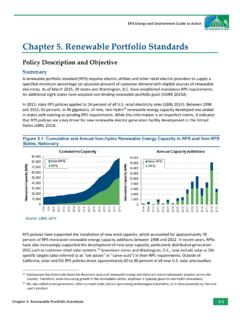Transcription of OFFICE OF PEOPLE’S COUNSEL - opc.state.md.us
1 STATE OF MARYLAND. OFFICE OF people 'S COUNSEL . Paula M. Carmody, people 's COUNSEL 6 St. Paul Street, Suite 2102. Baltimore, Maryland 21202. 410-767-8150; 800-207-4055. BILL NO.: Senate Bill 481. Community Solar Energy Generating System Program COMMITTEE: Senate Finance HEARING DATE: March 3, 2015. SPONSOR: Senator Ramirez et al. POSITION: Oppose Senate Bill 481 creates a new Section in the Public Utilities Article to establish a Community Solar Energy Generating System Program. The Bill would allow subscriber organizations to own and operate community solar systems on behalf of subscribers. The Bill would permit regulated electric utilities to seek approval from the Public Service Commission ( Commission ) to own and operate such systems on behalf of subscribers.
2 The Bill would also require the Commission to adopt regulations for consumer protection and interconnection with electric companies and to create a tariff structure for subscribers to receive credits . consistent with those provided under the current net energy metering law. While OPC supports the eventual development of community solar initiatives, and previously has supported a pilot The OFFICE of people 's COUNSEL Testimony on SB481. March 3, 2015. Page 2 of 8. program for community solar generating facilities,1 we oppose Senate Bill 481 for the reasons stated below. Prior OPC Positions on Community Energy Bills OPC has submitted testimony on community energy bills, which have been introduced every year since 2012.
3 In general, OPC has supported the concept of community energy, but we have favored the adoption of pilot programs and assessments, including the study of relative costs and benefits, prior to any wholesale adoption of community energy (including community solar). The first community energy bills (House Bill 864/Senate Bill 595) were introduced during the 2012 legislative session, but did not pass. However, at the request of the Senate Finance Committee, the Public Service Commission did direct a PSC Work Group, called the RM 41 Net Energy Metering Work Group, to consider a number of questions related to the feasibility of community energy facilities.
4 OPC actively participated in that work group, which produced a Report. In 2013 House Bill 1128/Senate Bill 699, which reflected many of the consensus recommendations contained in that Report, were introduced. OPC supported those bills with amendments, although they did not pass. Of particular importance to OPC, those bills would have established a three year pilot program under the Commission's oversight, with size and other limitations, and required the submission of an assessment report to the General Assembly after completion. A significant component of that pilot would have been an assessment of the cost and benefit implications of community energy facilities for both participating customers 1.
5 In 2014, OPC supported with amendments SB786, which would have established a community solar pilot program. The OFFICE of people 's COUNSEL Testimony on SB481. March 3, 2015. Page 3 of 8. ( subscribers ) and utility customers who are not participating in net metering or community energy initiatives. Those bills did not pass. Finally, in 2014, OPC supported with amendments House Bill 1192/Senate Bill 786, which would have established a three year pilot program, with an assessment report provided to the General Assembly. Again, OPC supported a fuller assessment of the operation of community energy programs, including an evaluation of both the costs and benefits related to these programs, particularly as they relate to subscribers and non-participants.
6 Those bills did not move forward either. Community Solar Generating Facilities Community renewable energy programs (primarily solar programs) and net energy metering, actual or virtual, have been topics of discussion for the past few years in Maryland and elsewhere. In general, community solar projects permit utility customers who cannot, or do not want to, install solar generating facilities on their premises to get the benefit of virtual access to the output of such solar facilities installed at a different location. A utility customer's share of the allocated electricity from the community energy solar facility would be subtracted from the customer's electricity usage for purposes of Billing for energy usage by the local utility.
7 In effect, this program would permit the aggregation of electricity customers to purchase the output of such a facility. The customers, known as subscribers, may receive credits through virtual net energy metering. OPC has supported the eventual development of community energy programs as a way to allow customers who experience barriers to installation of their own renewable systems to obtain benefits indirectly through a subscriber system. These programs have been identified as a way The OFFICE of people 's COUNSEL Testimony on SB481. March 3, 2015. Page 4 of 8. for renters, low-income and moderate income customers, as well as customers who cannot install renewable facilities on their property, to participate in the adoption of renewable energy By contributing to overall supply diversity, these initiatives also may provide certain benefits for reliability and price stability for utility customers.
8 While there are benefits, there also are complexities, including costs and cost-shifting for customers as a whole. Therefore, OPC has supported legislative initiatives to the extent that they establish pilot programs and opportunities to conduct studies of the relative costs and benefits of these programs before they become full scale Unfortunately, Senate Bill 481 takes us back to square one by (1)proposing a non-pilot program, (2) not providing for any study or assessment of the relatives costs and benefits related to community solar and virtual net energy metering, and finally, (3) permitting electric companies to get into the business of owning or operating community solar and having all of their utility customers pay for it.
9 The OFFICE of people 's COUNSEL has the following concerns with regard to Senate Bill 481: 1. Full-scale implementation without any pilot program or study. The Bill provides for full implementation of a community solar program, instead of adopting a more deliberative process, conducted by the Commission, to assess system reliability and integration issues and to properly evaluate the benefits and costs, individual and system-wide, with these types of programs. 2. See, for example, The Abell Foundation Report, Clean Energy for Resilient Communities: Expanding Solar Generation in Baltimore's Low Income Neighborhoods at communities.
10 3. OPC has submitted testimony this year in support of Senate Bill 398 (Public Service Commission Community Solar Projects or Virtual Net Energy Metering A Study). The OFFICE of people 's COUNSEL Testimony on SB481. March 3, 2015. Page 5 of 8. While OPC acknowledges that costs and benefits may flow between the participating customers and the customers who do not participate, there is no standard methodology to assess costs and benefits for participants and non-participants of net metering and properly allocate the net costs and benefits to the utility customers. The Bill itself seems to indicate that only benefits will flow as a result of these programs.





